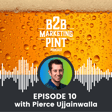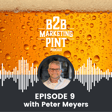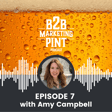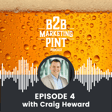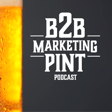Become a Creator today!Start creating today - Share your story with the world!
Start for free
00:00:00
00:00:01

🎙️Demand Gen Across Borders: How to Scale with AI, Partners & Competitors Too 🌍
From Fortune 50 boardrooms to scrappy startup scrums, Santosh Kumar has seen what works—and what flops—when it comes to scaling demand gen across time zones. In this episode, he joins Brian and Brendan for a cross-continental conversation on:
- Why your U.S. playbook won’t work in Vietnam
- What demand gen looks like when partners—and even competitors—join the effort
- Why startups can be too agile, and enterprises not agile enough
- AI: Who has the edge—startups or giants like IBM?
- The #1 mistake in global marketing (and what to do instead)
This one's full of practical, field-tested advice. Whether you're navigating APAC or North America, grab your coffee (or tequila?) and learn how to make demand gen work across borders.
Transcript
Intro
00:00:27
Brendan and Brian
Hi everyone. Welcome to this episode of the B2B Marketing Pint. ah You might notice a couple differences. One, Brian and I are actually together in the same room, which is awesome. So we're giving this a go.
00:00:38
Brendan and Brian
Let us know what you think. And we're in a pub, which we built for the podcast. Just for this episode.
00:00:43
Santosh
Thank you.
00:00:44
Brendan and Brian
Just for this episode? You mean we have to give it back? Well, if this episode takes off, we'll keep the pub. Okay. wo Because I put a lot of work into this. It's true. ah We're together, but our guest today is not.
00:00:57
Brendan and Brian
He is ah far away, actually, ah but very glad that he was able to join us. Brian, why don't you ah tell us who's with us today? I would love to. I'd love to introduce everybody to Mr. Santosh Kumar, coming to us live from Bangalore.
00:01:12
Brendan and Brian
ah And Santosh and i we go back a few years, Mr. Kumar. I can't remember where the first one was, but ah back when I was with IBM and...
00:01:23
Brendan and Brian
Santosh, your original stint with IBM, we got to play together and work hard together in Bangalore a number of times and enjoyed it thoroughly.
00:01:29
Santosh
Mm-hmm.
00:01:31
Brendan and Brian
But for the sake of our listeners, I'm going to introduce you by saying Mr. Kumar here is a seasoned, doesn't mean old, just means experienced, a seasoned demand generation leader.
00:01:43
Brendan and Brian
ah You spent your career helping global companies from high growth startups to Fortune fifty s And you've helped them find, engage, and convert customers all over the world, across borders, and that's part of what we're going to be talking about today, across time zones, across different buying cultures and agendas.
00:02:01
Brendan and Brian
ah Right now, I've heard through the grapevine that you're leading IBM's ecosystem for partners across APAC, across Asia-Pacific region. Let me try that again. Asia-Pacific region.
00:02:14
Brendan and Brian
region. like It's early. It's really early. That's one of our challenges today. We're going to get to that too. And Santosh, you've built and scaled demand functions all over the place, India, Singapore, Seoul, and a lot of other places, led integrated programs across digital partner channels, field marketing, inside sales, analyst relations, and even brand.
00:02:35
Brendan and Brian
And so we believe, and that's why we invited you here, that you in ah you bring a hard-won perspective on what it takes to drive growth at scale and how to unify a global go-to-market teams with one vision.
00:02:40
Santosh
Yes.
00:02:49
Brendan and Brian
So that's who Santosh is. Did I get anything wrong, Santosh? You want to correct the record?
00:02:53
Santosh
No, I think perfectly fine. It's good to speak to you again, Brian. And it's not years, it's decades, I think, that we know each other.
00:03:01
Brendan and Brian
Gee, thanks.
00:03:01
Santosh
And any friend of Brian is a friend of mine. Brendan, good to meet you. Thank you so much for having me here. I'm excited to do this with you guys.
00:03:11
Brendan and Brian
Awesome. Now I know why it took us so long to get Santosh on. Like that's an impressive background and no wonder he's a hard man to pin down. It's true. I'm exhausted listening to his background. It's true. He's a hardworking man.
00:03:24
Brendan and Brian
Santosh, i have another important question for you today, which is and key to what we do here on B2B Marketing Pint. What are you drinking today?
00:03:31
Santosh
Well, it's Friday evening here in beautiful Bangalore and i am drinking a hot cup of coffee in my IBM branded mug. but I basically reserve all my day drinking to Monday mornings because that's when I need it the most, like a few tequila shots here and there and then I get right to work, right?
00:03:52
Santosh
But this Friday evening is just black coffee for me. What are you guys drinking?
00:03:55
Brendan and Brian
Fair enough. Uh, well, thank you for asking. I'm going to plug, ah we're in Ottawa for this podcast. I'm going to plug a local coffee shop by the name of bridgehead local success story.
00:04:06
Brendan and Brian
And, uh, we're not drinking beer today because the time zone means it's very early for us. It's kind of late for you. You are drinking coffee late. God bless you. Uh, but I'm having bridgehead. What do you got? Brendan? Uh, I'm, I'm going to try and match, uh, Kumar or Santosh and, uh, I'm using a zinc marketing mug.
00:04:25
Brendan and Brian
Of course. So I see your IBM mug and raise you as a marketing mug.
00:04:29
Santosh
Nice.
00:04:30
Brendan and Brian
Um, and I'm drinking, I don't know what this coffee is.
00:04:30
Santosh
nice
00:04:32
Brendan and Brian
It's just what's here at the head office where we're also, I think you know we've got a better chance of bridgehead sponsoring us than either IBM or zinc. Am I not already sponsoring this? i don't think so. Okay.
00:04:44
Brendan and Brian
All right, well let's get started enough of this banter and back and forth and preamble, uh, cause we have Santosh and we want to pick his brain for the next 20 or 30 minutes. ah So Brian set it up nicely with your background and global perspective.
00:04:59
Brendan and Brian
So I'm going to start with an easy question.
00:05:00
Santosh
and
00:05:01
Brendan and Brian
They get harder. Trust me. um In your mind, Santosh, what's the secret sauce for demand gen that, you know, works across borders?
00:05:10
Santosh
ah Is this the easy question?
00:05:13
Brendan and Brian
yeah Yeah, yeah, yeah, yeah. They only get harder from here.
00:05:15
Santosh
and Okay. Okay, good. So, oh I think um if I were to make a movie reference, for example, i would make a ah reference to Kung Fu Panda, which says there is no secret ingredient.
00:05:28
Santosh
Right? So, I That's the fun answer. But if I were to really think through, I think the secret sauce is basically getting your basics right as a marketing unit and also as ah as an organization.
00:05:43
Santosh
right Because many times we are caught navel gazing and we think our product is the best fit for the market. And we are thinking product out and not really customer, thinking about the customer and looking at it from their POV.
00:05:58
Santosh
and For example, you spoke of a bunch of countries when you're introducing me. A tech buyer in Indonesia is looking to solve a very different problem with the same product compared to someone in the United States.
00:06:12
Santosh
right So if you go with the same approach that you have in the US and come and try it in Indonesia, for example, there's no way that you're going to make the sale. right So there's no point in even trying an approach that works in one country and assume that it works in another country. right So that's first, start with the customer.
00:06:30
Santosh
I think the second one is you need to also be cognizant and understand that buying patterns are different in different cultures. For example, if I were to speak about Taiwan and Vietnam, for example, I'm giving a ah lot of different names for your audience, so hope that's okay.
00:06:46
Santosh
So Taiwan and ah Vietnam, for example, um Most of the tech buying happens based on relationships and perceived trust with the person that they're engaging engaging with. right So they want whatever you're selling and whatever you're saying and promising to the end customer, you're going to follow this through.
00:07:07
Santosh
And it's almost like a pact. So if that is the buying pattern of this particular market and you're coming with a very different approach, that's not going to fly as well.
00:07:18
Santosh
and And the third point, maybe it's something that all of us are very familiar with, localization. I think localization plays a very, very important role, not just from a content perspective, your case studies and your assets and your white papers, whatnot, but even references. So if you're giving a reference, um again, of an American customer who has bought and used this product, but the context in which this person is buying it is very, very different.
00:07:48
Santosh
There's no way that that client reference will even act as a testimonial or make sense to this particular customer. So you really need to figure out localization. It's not just about content and creatives and whatever messaging. It could also be around engagement types as well right so some people might like a roundtable sort of a setting where they're looking at what their peers are doing hearing ah another CEO or CIO out saying that this was a challenge I had and this is how I solved it as opposed to ah just attending a third-party event or a large conference and listening to a keynote and they're making up their mind right there right and
00:08:28
Santosh
I think one of the things that we do a lot of is do a lot of discovery workshop one on one. If it's a large client and there's a large deal ah that we are trying to crack, I think discovery workshops and one to one engagements really make a huge difference. So I would say um just to summarize all the ranting that I've done all this while.
00:08:49
Santosh
I think you need to get your basics right and try to get more hits on the board than misses. I think that would probably try and nudge your pipeline and win revenue in the right direction as opposed to ah ah just trying some strategies for the heck of it.
00:09:08
Brendan and Brian
Cool. I love that. There's a lot to unpack in all of that. um My favorite bit was early on, you said it's easy to get caught navel gazing. And I love that expression because I've been part of that mistake at various places and times where you might fall in love with your own messaging and be completely convinced that everything you're saying to the market is totally right. And maybe maybe ah you lost the plot. Maybe the market moved on and your messaging isn't appropriate anymore. So I love that point. That's really good point.
00:09:36
Brendan and Brian
um I've got to follow up to that. And this is, it tries to bring your experience, Santosh, both, I know you worked at some startups, you were at IBM when we worked together, you did some startups as well, and now you're back at IBM leading the Asia Pacific group.
00:09:52
Brendan and Brian
ah So my question is, if you've done both startups and you've worked at Fortune 50s, those are not the same places to work whatsoever, but you have the same task, or you did before partners, you did a lot of demand gen. what What's the big difference between trying to do demand gen at a scale-up or a startup versus a Fortune 50? How do you have to change your mindset? What are your different tactics?
00:10:17
Brendan and Brian
Or is it just ah another version of the same game? What do you think?
00:10:21
Santosh
Yeah, I think Brendan was right when he said the questions are getting more and more complex as we go to the conversations.
00:10:26
Brendan and Brian
you Just wait. Just wait for the last one. Okay.
00:10:32
Santosh
So, ah see, I've been really fortunate to work in but both worlds. I think both the worlds are very, very different ah from each other, like like you rightly pointed out.
00:10:43
Santosh
And one thing that I was looking for when I joined ah the few startups that I worked at was having the authority to call your own shots. And I think with authority, there comes a lot of accountability as well. That's what I was not prepared for. Right. So I like the authority. I like doing things on my own. I like.
00:11:03
Santosh
calling the shots, but it also comes with a lot of accountability. For example, there was this one time where we had to launch a website in a startup. And the at the at the right time, or maybe I should say wrong time, our content marketer left the organization. so and and And it was ah the end of the year. There was no way they were to approve any marketing budgets. And I basically had to sit and write the entire website content myself because the content marketer is not there right so i think ah when it comes to startups the resources are a are a little thin which is where i feel uh when you look at a larger enterprise for example the resources are there and maybe startups could actually pick a few tricks from how an enterprise does it um and and
00:11:54
Santosh
obviously you really need to be mindful of the budget and we know for a fact startups have a shoestring marketing budget that's where agencies like yours comes into picture so they need to build this agency ecosystem where ah a lot of the heavy lifting or a lot of the groundwork is done by someone else and you are basically focusing on the strategic direction that your organization has to take. So I think ah when it comes to large enterprises, they can definitely learn agility and moving fast and being more tuned into what the market ah is really demanding from your product line.
00:12:33
Santosh
I think that's something that the large enterprises can pick up from the startups. But on the flip side, i think What startups can pick up from large enterprises is strategic thinking.
00:12:45
Santosh
I think you need to think a little more long term and not just have a knee jerk reaction to whatever the market does and keep changing your product line and keep changing all your marketing tactics. Just because ah the the startup next door is doing something, you don't need to kind of do it. You need to have a more of a long term vision and try to scale what really works. I think that's where some of the large enterprises really make a difference. If they have found a playbook that really works and resonates with the audience that they're going after, I think large enterprises find a way to scale that idea and replicate it in in multiple countries and newer markets so that they end up with a larger slice of the pie.
00:13:32
Santosh
Yeah?
00:13:33
Brendan and Brian
Yeah, that's ah couldn't agree more about the about the basics. And also, you know, that constant tweaking or changing that startups tend to do. And you definitely need the longer term view.
00:13:44
Brendan and Brian
I think what also was interesting to kind of take us on yet another tangent, maybe on this call, ah And what interested me when we first when we first met and chatted about doing this episode was, you know, your ecosystem view, because a lot of, you know, especially startups, but even larger organizations, a lot of the demand gen is direct for the direct sales team.
00:14:06
Brendan and Brian
But your ecosystem view is interesting and perspective. And I want to kind of go down that path because I know you also look at it not just in terms of channel partners, which a lot of people think about immediately,
00:14:17
Brendan and Brian
But you also mentioned, you know, working with competition, ah which ah is a whole different can of worms I can imagine. So, you know, walk me through um how you see the ecosystem from channel partners to competitors and others partners ah come into play when we talk to ManGen.
00:14:36
Santosh
Yeah, great question again. and i And I agree, it's getting more and more serious now. ah
00:14:41
Brendan and Brian
Yeah.
00:14:41
Santosh
i think yeah I think I love channel, but right? I was a little late in my introduction to the channel space. But I think now that I am in the ah right and and in the middle of it, I think I really enjoy working with our partners, working with our distributors to kind of amplify our messaging.
00:15:02
Santosh
And if I were to just back up a little bit and think about how complex the tech landscape is and kind of zoom in on one particular organization, for example, any midsize company ah has a minimum of 40 to 50 plus tech products in their tech stack. And this is just a midsize company. Forget about the large banks and the manufacturing units and the retail giants, right? Their tech stack is extremely complex.
00:15:33
Santosh
For you to think that the right way to approach this particular complex tech stack mid-sized company with just your sales organization, I think is the easiest way to fail.
00:15:46
Santosh
You need to understand that your market reach can be much more amplified with a broader set of partners who are looking at not just making their mark margins, but also selling your product along the way as a product or solution along the way as well.
00:16:04
Santosh
So I think partners really bring ah bring in that X factor into into your sales outreach and demand gen efforts. They could have better a better price point ah to or or a proposition to ah to a prospect or they could layer in some additional services which the prospect really likes which our organization probably is not in a position to kind of ah present to them.
00:16:30
Santosh
So I think that is one ah thing that I would like to highlight, which is the X factor that a partner brings. Second, I think also access to the market. right So let's assume an organization has 10 salesmen who are focusing on a particular territory.
00:16:45
Santosh
What about all the other territory where there are potential prospects? So you need additional boots on the ground and those boots on the ground are basically your partners. Your partners have a wider or a broader ah reach to the market and they can penetrate into those tier two, tier three cities, which might not even be in your overall territory. Right. So so that is one. I think.
00:17:09
Santosh
I initially spoke about buying patents, but if you also look at tech selling from a seller's perspective also, there is a massive shift that we are seeing throughout throughout the the last few years. I think more organizations and tech enterprises are focused on co-creation ah versus competition.
00:17:30
Santosh
like They want to co-sell with you as opposed to competing with you because like I said when I started at this point the tech stacks are extremely complex so for you to assume that one solution from one particular organization is going to solve all the challenges that this organization has it's impossible right so you need to think about it from a ah co-selling perspective as opposed to trying to compete with your other whoever is to your right or your left So that's where I think the value of ecosystem and channels go to market strategies are extremely important, not just for a large enterprise, but also for a midsize and a startup. They need to really get their channel game right.
00:18:15
Brendan and Brian
makes Makes a lot of sense, Santosh. I especially connected the this response to one of your previous ones where you talk about um having, you said boots on the ground here.
00:18:26
Brendan and Brian
but, but extending your ability to sell, especially in cultures or places where the person to person relationship is that much more important, which if I'm being honest, where we are, I think ah we've lost some of that over the last as tech exploded. It's sometimes even hard to get and Like we're in a room together today. Wow. That doesn't happen as often as it used to. you Let's put it that way.
00:18:46
Brendan and Brian
So I really liked that point about extending your your, boots on the ground through your partners. And that would help you sell and in those environments where the the connection, the human to human connection is that much more important.
00:18:57
Brendan and Brian
That makes a lot of sense. But I'm going to transition now to, I think this is the big question. The big one. I think this is think this is the big one because I don't know, you're probably aware of this, well aware of this already sent us. You're not allowed to have a technology marketing discussion today without one acronym.
00:19:15
Brendan and Brian
And that acronym is AI. And we would be canceled if we didn't use that acronym in this podcast. So my question is, because you've again, you've done the startups, you're at a Fortune 50, you've probably seen how it's done in both places.
00:19:29
Brendan and Brian
How is the AI story different considering ah you know the news and social media are full of everyone claiming these massive gains, these massive changes in AI and their efficiency and their processes.
00:19:42
Brendan and Brian
Do you see, is the story the same inside the walls of a Fortune 50 where they can actually build, develop, and work on AIs and and have massive teams on it? um Or is it tougher inside a Fortune 50 to adapt on the fly and be as nimble as these these little startups who are trying new things every day with it and launching new things and making a splash in the press.
00:20:02
Brendan and Brian
What do you think? Who who do has the edge in AI? Is it is it Fortune 50s with their might and their money and their teams and their power? Or is it nimble startups? Who's got the edge in AI from from your perspective?
00:20:13
Santosh
very Very loaded question. And I'll have to gravitate towards the organization that I work for who's given me this beautiful mug.
00:20:15
Brendan and Brian
Yeah.
00:20:20
Brendan and Brian
Sure.
00:20:23
Santosh
ah ah but But seriously, I think great question. And the honest truth is, if you're in the tech space and you're not using AI today, right I think you should be ready to be out of your job in the next two years.
00:20:38
Santosh
like as as As simple as that. Because forget about blue-collar jobs. If you're in a tech industry, you better be using AI. If you look at my phone right now, I think I have at least 10 different AI apps which I use for different purpose ah purposes, both from a personal perspective.
00:20:55
Santosh
front and also from a professional front, right? So I think AI is extremely important for you to adopt and you definitely need to be skilled on using the right prompt. They call it prompt engineering, but I'll just say prompting, right?
00:21:11
Santosh
And to to answer one of your very nuanced questions, how does it look within the walls? I think, right, from IBM perspective, I think we are an AI and hybrid cloud organization ah right now.
00:21:25
Santosh
and rightly so we drink our own champagne that we that we are making we are very strong adopters of ai just last year we did about six billion plus of ai revenue and and a lot of those use cases and ideas basically came from an initiative that we did here in ibm which is called as client zero. right We consider o ourselves as a client zero before we actually take our AI solutions out there in the market. right
00:21:56
Santosh
So we have built use cases not just across all the functions, HR, you talk about sales and marketing, you talk about procurement, you talk about the developer community. All of them go through this cool,
00:22:09
Santosh
crowdsourcing project that we do semi-annually. And we all pull in all our suggestions on how we can make this work better. And there's like a voting mechanism. And the best ideas are picked. And we invest time and resources in making sure that that problem is firstly solved using AI.
00:22:27
Santosh
And then we think, whether can this be monetized? right And most more ah most often than not, if there is a challenge in a company like IBM, there's also a problem in a company in in another organization who's competing with IBM right so we might as well package it and sell it right so I think from that standpoint I like the direction we are taking with when it comes to AI and how we are going about building ah the future of tomorrow I think even if you look at startups today, I think they use a lot more of ah of free tools as opposed to custom tools.
00:23:01
Santosh
um There is a differentiation out there in the market, which is around AI for consumers versus AI for business. I think the consumer ah AI is what is really taken off thanks to folks like ChatGPT, for example.
00:23:17
Santosh
But I think when you think of ah AI for business, there's a lot more... ah data points and the quality of the inputs that you're providing into your LLM models really ah ah comes into play.
00:23:31
Santosh
So I think the way you need to look at consumer AI is very different from how you would probably look at AI for business. So I think ah if you are selling to a tech buyer, I think AI for business is the right way to go. Because you need to be able to trust the model is trained on data that you can really trust.
00:23:54
Santosh
And there needs to be some sort of governance to these LLMs as well. Otherwise, it's just going to prompt something. You're going to assume that it's the right prompt and go ahead with the the judgment. And it might or might not be the right judgment that you're making.
00:24:11
Santosh
and right so I would lean towards using LLMs which you can actually trust and models that are built for your particular use cases.
00:24:21
Brendan and Brian
Yeah, fair enough. Nobody wants to build a marketing plan based on a hallucination. But I think we can all agree that the last people that will be replaced by are podcast hosts. Are you sure? That seems obvious to me.
00:24:35
Brendan and Brian
I think we have got time for one more, Brendan. Yeah, I mean, and we could probably ask 20 more on the AI topic. So maybe we'll have to try and get Santosh to squeeze us into a schedule one one more time. We can do an episode in Bangalore.
00:24:49
Brendan and Brian
Yeah, that that may have been simpler than building a pub in retrospect. Yeah, ah I do. I do want to just stop on one thing. And maybe this is the localization point live on our podcast.
00:25:01
Brendan and Brian
So Santos said, you know, we drink our own champagne. Yes. Which sounds a lot better than eating your own dog food, which is the expression I would use. yeah So, you know, I got to I got to remember that one um because, yeah eat your own dog food just doesn't sound good. And we can probably bill more for using champagne instead of dog food.
00:25:18
Brendan and Brian
That's true. um And you're right. We do have one more question for you, Santosh. And we did save the hardest one to last as promised. And this is why no guests ever come back, I think.
00:25:26
Santosh
you
00:25:29
Brendan and Brian
No repeat guests. Yeah. Well, Santosh, here's your chance to answer the tough question and come back. um So you've you've done this for a while and I'm sure you've seen things, you've tried things, you've learned from your mistakes. So we're going to ask you, you know,
00:25:47
Brendan and Brian
What's the one challenge and demand, Jen? What's the one thing you've done that maybe be flopped, didn't go as well as you had hoped? um And what did you learn from that? So, you know, kind of from your own experiences, you know, what's that one thing you wish you could do over and here's what you learned from it?
00:26:07
Santosh
Yeah, I just need to look through one TB of data, maybe the number of data I've done wrong in my career.
00:26:11
Brendan and Brian
Yeah.
00:26:16
Santosh
but But yeah, I think one thing definitely pops up to my mind and it's got nothing to do with demand gen or marketing in essence. I think it's got to do with ah organizational alignment and change management, right?
00:26:31
Santosh
Because, see, there was this one time in ah in a startup where I had this bright idea that we had to do ABM. and not regular marketing in this particular organization because to be honest, they had 95% of their revenue coming from about 60 clients.
00:26:51
Santosh
And when I joined the organization, it was kind of a no brainer. I'm not going to do traditional marketing. I'm not going to spend a lot of money on digital marketing. and broad brush tactics which the company used to be doing.
00:27:03
Santosh
But I think we need to be a lot more deliberate and focused on our efforts and whatever limited resources we have, we should invest in cross selling and upselling to these clients and just getting a larger wallet share from those customers. right so and the And the way it worked in the startup, it was a funded startup, which funded startup means there is a board involved in every single dollar that you're going to spend.
00:27:30
Santosh
So there was this very fancy location. There was a board meeting happening. And I had prepared for this presentation for close to about a two to three weeks.
00:27:41
Santosh
And I had every single data point to the dot. And I went and pitched my idea to the board. right And and it is it is a pretty daunting task to talk to the board, by the way.
00:27:53
Santosh
there are ah ah There are people who are in your favor. There are people who just want to oppose you for the heck of it. right so So here I am. This is the reason why we need to do ABM strategy.
00:28:06
Santosh
I've done all this analysis. And if we follow this approach when it comes to marketing, this is the outcome that you're going to see. And the first thing ah ah that one of the board members said is no.
00:28:18
Santosh
I'm not going to do this. I'm not going to fund you. I'm not going to give you the money. And I asked why, because this idea is not proven. It's just you telling me that this works.
00:28:30
Santosh
And you said traditional marketing, and I'm a traditional person. I believe in traditional marketing. I don't think your idea is going to fly. right so And I was obviously crestfallen, wondering what I did wrong.
00:28:40
Brendan and Brian
Yeah.
00:28:42
Santosh
did my ah two to three weeks of ah prep work all go in vain. But luckily, I had a couple of other folks in in the audience who really understood what I was trying to say, the the sales leader and the delivery head, ah because they were trying to pitch this particular idea for quite some time and and it didn't fly.
00:29:00
Santosh
So all three of us got together. We huddled. We ran a pilot and on a shoestring budget. We just scourged through some budget here and there and we bought a tool we engaged an agency we started doing proper abm strategy and this board meets on a monthly basis so the next meeting i was there again in front of them and i showed them that hey This is a one month pilot and this is the outcome that we saw.
00:29:28
Santosh
We have reached X number of decision makers. We have moved the conversation of this particular opportunity to this stage. And I think it really works. And to answer your question, ah traditional marketing is great, but I think the way this company needs to go is account based marketing.
00:29:47
Santosh
and Right. So and I think that was ah received in a better way. Then blanket no. And I was, I think one of the key lessons that I got out of it is I think you need to first run a pilot and you need to test your theory before ah putting a bold idea out there in front of a board or any senior in your organization. So for all the marketers who are listening, I think test out your ideas. Testing is not a bad idea at all.
00:30:16
Santosh
and run small pilots in whatever limited budget you have before trying to change the world and change the way your organization approaches marketing.
00:30:27
Santosh
right Is that a fair answer, Brandon?
00:30:29
Brendan and Brian
That's a great answer. Yeah. I feel like I've been in some of those rooms. Yeah. I love, love the pilot and I love the fact that you, you just went ahead and did it, even though the board told you not to.
00:30:44
Brendan and Brian
That's good. That's really good. But that was great. Yeah. I mean, thanks a lot, Santosh, for taking time from your busy schedule and joining us. And I mean, I was serious about having you back, at least on the AI conversation, but now I want to have you back on the ABM one, too. And yeah localization one and the oh, maybe I should stop.
00:31:03
Brendan and Brian
I'm scaring them. You might need to do a number of episodes.
00:31:08
Brendan and Brian
Yeah, I'm going to pass on my thanks as well. I know the the schedules are very different and you're actually sacrificing some of your Friday evening right now for this. So thank you so much for that. I also want to point out to our listeners that this guy, Santosh is not just an incredibly hardworking tech dude. He's actually got a very happening, awesome, beautiful family with him in Bangalore. He's a family man.
00:31:27
Brendan and Brian
And one of the reasons Brendan and I are not drinking beer today, is he, Santosh kind of makes us look bad because he's also a gym guy and a boxer and a health guy.
00:31:33
Santosh
Thank
00:31:35
Brendan and Brian
So I'm like, well, I got to drink coffee instead of beer I'm going have Santosh on. So we built a pub, named it the B2B marketing pint, and now you're saying we should stop drinking. And now we're drinking coffee. Yeah.
00:31:45
Santosh
you.
00:31:46
Brendan and Brian
So the best laid plans. So thank you so much. Please, please extend our thanks and appreciation to your family for sharing you on a Friday evening. And of course, I expect tons and tons of of fan mail from both of our listeners.
00:32:02
Santosh
Awesome. it's it's ah it It was a pleasure to talk to talk to both of you. I love the banter in between all the serious questions as well. So I look forward to um meeting you at some point, ah hopefully ah somewhere midway from Ottawa and Bangalore.
00:32:18
Brendan and Brian
Sounds like Iceland. Oh, I want to go to Iceland. Okay. All right. Next location. Next episode. All right. Thanks a lot, Santosh.
00:32:25
Santosh
Awesome.
00:32:27
Brendan and Brian
You take care.
00:32:27
Santosh
Thank you. Bye.
00:32:29
Brendan and Brian
Bye.
